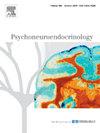台湾青年的童年逆境、韧性与炎症的关系。
IF 3.6
2区 医学
Q2 ENDOCRINOLOGY & METABOLISM
引用次数: 0
摘要
心理弹性是一种承受压力、创伤和负面生活事件(如童年不良经历)并从中恢复的能力。然而,关于恢复力减轻ace的心理影响的生物学机制知之甚少。我们旨在通过炎症蛋白质组学小组确定反映早期生活压力和心理恢复力综合影响的差异表达蛋白(DEPs)。采用三种不同的心理弹性和ACE问卷,根据心理弹性和ACE的高低将参与者分为四组。选择45名年龄匹配和性别匹配的参与者,用Olink的92种蛋白质炎症面板进行蛋白质组学分析。其中,只有32个通过了质量控制过滤进行分析。结果表明,CD274在弹性谱中作为蛋白枢纽出现,而CXCL5在ace相关谱中处于中心位置。网络共表达分析显示组特异性蛋白重布线,提示高ACE个体炎症失调。相比之下,高恢复力谱显示出更强的免疫检查点共表达,表明更有效的炎症解决是恢复力的关键特征。这些发现表明,恢复力维持一个适应性免疫网络架构,可以用来促进早期逆境后的恢复力。本文章由计算机程序翻译,如有差异,请以英文原文为准。
Relationships between childhood adversity, resilience, and inflammatory profiles in Taiwanese young adults
Psychological resilience is the capacity to withstand and bounce back from stressors, trauma, and negative life events, such as childhood adverse experiences (ACEs). Yet, little is known about the biological mechanisms by which resilience mitigates the psychological effects of ACEs. We aimed to identify differentially expressed proteins (DEPs) that reflect the combined effects of early life stress and psychological resilience by using an inflammatory proteomics panel. Three different resilience and ACE questionnaires were employed to classify participants into four groups according to high vs. low levels of resilience and ACEs. Forty-five age-matched and sex-matched participants were selected for proteomics profiling with Olink's 92-protein inflammatory panel. Of these, only 32 passed quality control filtering for analysis. Results showed that CD274 emerged as a protein hub in resilient profiles, while CXCL5 was central to ACE-related profiles. Network co-expression analysis revealed group-specific protein rewiring, suggesting dysregulated inflammation in individuals with high ACE. In contrast, high-resilience profiles showed stronger immune checkpoint co-expression, indicating more effective inflammatory resolution as a key trait of resilience. These findings suggest that resilience maintains an adaptive immune network architecture that may be leveraged to promote resilience after early adversity.
求助全文
通过发布文献求助,成功后即可免费获取论文全文。
去求助
来源期刊

Psychoneuroendocrinology
医学-精神病学
CiteScore
7.40
自引率
8.10%
发文量
268
审稿时长
66 days
期刊介绍:
Psychoneuroendocrinology publishes papers dealing with the interrelated disciplines of psychology, neurobiology, endocrinology, immunology, neurology, and psychiatry, with an emphasis on multidisciplinary studies aiming at integrating these disciplines in terms of either basic research or clinical implications. One of the main goals is to understand how a variety of psychobiological factors interact in the expression of the stress response as it relates to the development and/or maintenance of neuropsychiatric illnesses.
 求助内容:
求助内容: 应助结果提醒方式:
应助结果提醒方式:


